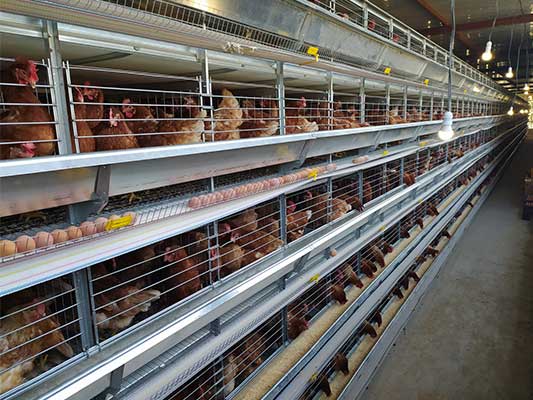Why Ghana’s Poultry Sector Needs Smarter Investment
For medium and large poultry farms in Ghana, the challenge is no longer simply increasing flock size – it is scaling sustainably with predictable costs, stable production, and minimal downtime. As feed prices fluctuate and labor becomes harder to optimize, the battery cage system price in Ghana has become an important factor in investment decisions. But beyond the initial purchase cost, farm owners now prioritize long‑term value: low maintenance, higher laying performance, durability in hot and dusty climates, and reliable after‑sales support.
This article explores how a modern poultry cage system, especially those equipped with automatic poultry equipment, can deliver long‑term savings and operational stability. As a leading global manufacturer, LIVI provides fully optimized chicken breeding equipment designed specifically for Ghana’s environment, infrastructure, and commercial farming needs.

1. Understanding the Real Cost Behind Battery Cage System Price in Ghana
Many farm owners initially compare only the upfront cost. However, the true value comes from lifespan, productivity gains, and daily operating expenses.
1.1 High Price vs. High Value: What Matters More
A cheaper cage system often leads to:
-
Frequent rust and corrosion in humid or coastal regions
-
Wire breakage or deformation under Ghana’s heat
-
High replacement and maintenance costs
-
Reduced laying rate due to poor comfort and stress
A well‑engineered system with anti‑rust metal, strong welding, and proper ventilation can last 15–20 years, delivering a far better return.
1.2 How Automatic Poultry Equipment Cuts Labor Cost
Labor can consume up to 30–40% of daily farm expenses. Automation solves this by integrating:
-
Automatic feeding machines
-
Auto nipple drinking systems
-
Automatic manure removal
-
Egg collection systems
This reduces dependence on labor, guarantees consistent feed/water supply, and minimizes human error—all of which significantly improve farm efficiency.
1.3 Payment Flexibility That Helps Ghanaian Farmers Scale
Medium‑size farms transitioning to large operations often struggle with cash flow during expansion. LIVI supports:
-
Negotiable phased payment plans
-
Project‑based payment scheduling
-
Long‑term cooperation pricing
This helps farmers invest confidently without stressing liquidity.

2. Local Adaptation: Built for Ghana’s Climate and Farm Conditions
A major pain point for Ghanaian poultry farmers is the mismatch between imported cage systems and local environments. LIVI designs its poultry cage system through deep market understanding.
2.1 Precise Fit for Local Poultry House Sizes
Many farms in Ghana use:
-
Converted warehouses
-
Block‑built poultry houses
-
Open‑sided structures with iron sheets
LIVI customizes cage dimensions so farmers can achieve maximum capacity without overcrowding or structural modification.
2.2 Compatible With Local Feed and Water Conditions
-
Nipple drinkers operate safely under varying water pressure
-
Feed trough depth accommodates Ghana’s common feed textures (mash, crumble, pellets)
-
Strong anti‑clog systems prevent waste buildup
This ensures efficient feed intake and reduces wastage.
2.3 Heat‑Resistant Designs for Ghana’s Hot Seasons
High temperatures lead to stress, lower egg production, and higher mortality. LIVI uses:
-
Hot‑dip galvanized steel with strong temperature tolerance
-
Cage angles that maximize airflow
-
Optional ventilation and cooling system integration
The result: stable laying performance even in the hottest months.

3. Durability & Low Maintenance: The Core of Long-Term Cost Control
When evaluating the battery cage system price in Ghana, durability directly determines ROI.
3.1 Anti‑Rust, Anti‑Corrosion Materials
LIVI cages use 275–450 g/m² hot‑dip galvanization, providing:
-
Long resistance to humidity and ammonia
-
Protection from coastal salt corrosion
-
Reduced long-term maintenance cost
3.2 Dust‑Resistant and Easy-to-Clean Structures
Ghana’s dust and dry seasons can clog feed lines and create sanitation risks. LIVI systems include:
-
Smooth surfaces preventing accumulation
-
Elevated manure belts to minimize odor
-
Efficient manure removal that reduces disease risk
Clean cages = healthier birds = higher egg output.
3.3 Strong Load‑Bearing Capacity
Heavy birds, large flocks, and daily movement require strong structure integrity. LIVI cages maintain shape under pressure, preventing bird injury and equipment damage.
4. Installation & After‑Sales: Service That Actually Reaches Your Farm
The difference between a good purchase and a bad one often lies in installation and after‑sales service.
4.1 On‑Site Installation by Local/Regional LIVI Engineers
LIVI dispatches experienced installation teams to Ghana for:
-
Complete cage system setup
-
Adjustment of feeding, drinking, and manure systems
-
On‑site operator training
Farm owners avoid installation mistakes that could affect flock productivity.

4.2 Fast Response for Parts and Maintenance
Breakdowns cost money. LIVI ensures:
-
Quick shipment of spare parts
-
Remote technical support via video
-
Scheduled maintenance visits
This guarantees minimal downtime.
5. Why LIVI Battery Cage Systems Deliver the Best ROI in Ghana
Summarizing the core value for farm owners:
-
Competitive battery cage system price in Ghana
-
High long-term durability and minimal repair needs
-
Boosted egg production through automation and animal comfort
-
Local environmental adaptation
-
Reliable installation and after-sales support
For medium and large poultry farms aiming for stable scaling, LIVI offers a complete, future‑ready solution.

